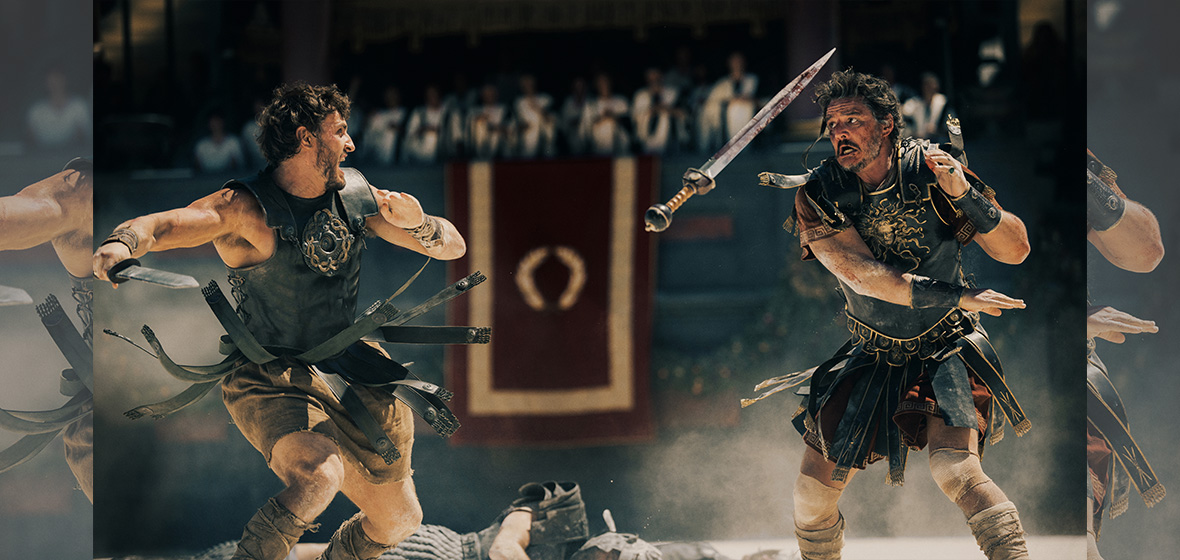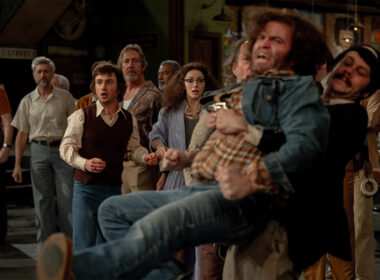Nick Cave tells an anecdote about being approached by Russell Crowe to write a sequel to Gladiator. “But doesn’t your character die?” he asks. “You’ll figure it out” was the response.
According to the Australian singer/screenwriter, the final result is a genre-defining era-hopping epic about Maximus making a deal with the Roman Gods to reunite with his wife and son and ending up fighting for a Christian army against the Roman forces through the centuries unto our modern times.
Cave admitted he had a blast writing the script, but he knew it would never be produced. Crowe’s only reaction to this script was “didn’t like it, mate.”
After watching Ridley Scott’s Gladiator II, the official sequel (sans Crowe) to his mega success and his only film to win an Oscar for Best Picture, I wished Cave’s premise had been chosen. In a year which gave us a master of cinema taking a risky, bold, and adventurous swing, Scott’s approach to expanding his vision of Ancient Rome so safely feels lacklustre. Here’s a quote for the poster: “I wish this was Megalopolis“.
Not everything is lousy. In fact, scratch that; none of it is. Scott is such a perfect filmmaker; he can do it all with his eyes closed and still be better than two-thirds of the films released every year in the cinema. But it’s also not explosive. The original declared classic status when it came out, ramming to the top of every dad’s favourite film list.
So without Crowe, Gladiator II follows Lucius (Paul Mescal), who was captured by the Romans after an attack on his home in Numidia. His wife died in battle, and Lucius promised revenge against the general who planned the attack – Marcus Acacius (Pedro Pascal), reluctant war hero and lover to Lucilla (Connie Nielsen), daughter of Marcus Aurelius and former lover to Maximus. Lucius accepts to be trained by Macrinus (Denzel Washington), a former slave turned gladiator trainer who also has political interests against the Emperors Geta (Joseph Quinn) and Caracalla (Fred Hechinger).
So, like with Maximus, Lucius’ slow ascent through the ranks of Gladiators is woven into a subplot of political conspiracy. While the first film felt streamlined and simplified, this one gets muddled by the many characters, factions, and plots. Lucius’s quest for revenge is quickly disregarded for a more significant issue, and there’s no better way to point out the shortcomings of David Scarpa’s script than his inciting incident is relegated to a mere macguffin.
Similarly to Scott’s Napoleon, the film is stylistically blessed by his technical knowledge and experience. The battle scenes are grandiose and exciting, so they feel short. Scarpa has more imagination when creating set pieces for the coliseum scenes than the rest of the script. Lucius fights a horde of rabid murderous monkeys and a gladiator on a rhino, and at some point, they enact a naval water battle. Is it historically accurate? Of course not. And it doesn’t matter. It’s brutal and sweaty; I would have 30 more minutes of it.
The cherry on top is Denzel, through and through, the MVP of the picture. Half classic Denzel, half Shakespearean villain, every scene he’s in is unfair to the other actors. No one can match his presence, though they try.
By comparison, Mescal doesn’t yet have the experience to carry an epic of this size. I love Mescal as an actor. Aftersun was my favourite film last year, and this year, he already swooned me in Andrew Haigh’s All of Us Strangers. He’s not Brando or Kirk Douglas – paragons of Western manliness whose voice alone can shut down a whole room, like Crowe. No, Mescal is Paul Newman or Robert Mitchum – intense and morose. Now, not to say he can’t shift to large-scale blockbusters, but after this effort, it feels like a misuse of his talents (thankfully, he’ll be back next year in Oliver Hermanus’ The History of Sound).
In the end, Gladiator II tries too hard to give what it thinks we want, and we are ready to be swept off our feet. Even the last act is safe. A good part of the plot deals with the idea of the moral decline of the Roman Empire and how it so quickly correlates to our current state of affairs. But we know history; we see what happens. To finish on a hopeful note that a saviour is coming to bring political stability feels like a grand misunderstanding of the film’s internal messaging.
Verdict: 3 out of 5
A by-the-books prestige blockbuster that tries to give its audience exactly what they want but fails to create an impact like the original film did.




